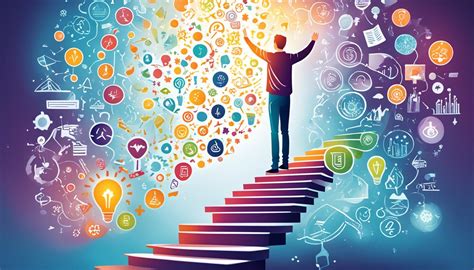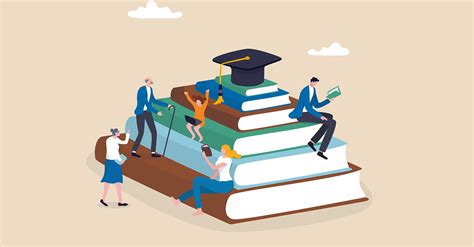
Lifelong Learning: Key To Success
In today’s relentlessly accelerating world, the notion of education as a finite period in one’s youth is utterly obsolete. The landscape of careers, technology, and global society evolves at an unprecedented pace, rendering static knowledge increasingly irrelevant. Consequently, lifelong learning has transcended being a mere aspiration; it is now an indispensable imperative, the singular key to success in virtually every domain of modern existence. For individuals striving for continuous growth, career resilience, and profound personal fulfillment, embracing a mindset of perpetual learning is non-negotiable. This critical commitment to ongoing intellectual expansion is also a highly sought-after topic, making it a powerful magnet for driving high Google AdSense revenue through engaging, authoritative content. This comprehensive guide will dissect the multifaceted concept of lifelong learning, explore its profound benefits across professional and personal spheres, unveil effective strategies for its cultivation, and cast a visionary gaze upon its transformative impact on individuals and society as a whole.
The Indispensable Role of Lifelong Learning
At its core, lifelong learning is the voluntary and self-motivated pursuit of knowledge for personal or professional reasons. It’s not limited to formal education like degrees or certifications; it encompasses every moment we choose to acquire new skills, understand complex ideas, or adapt to changing environments. This continuous pursuit of knowledge is driven by curiosity, a desire for personal development, and the undeniable demands of a dynamic global economy.
The necessity of lifelong learning stems from several undeniable realities:
- Rapid Technological Advancement: Fields like artificial intelligence, biotechnology, and automation are transforming industries overnight. Skills that were valuable a decade ago may be obsolete tomorrow. Continuous learning ensures adaptability.
- Shifting Job Markets: The gig economy, remote work, and the rise of new industries mean traditional career paths are less predictable. Individuals must constantly upskill and reskill to remain competitive and relevant.
- Information Overload: The sheer volume of information available requires individuals to develop critical thinking, discernment, and efficient learning strategies to process and apply knowledge effectively.
- Personal Fulfillment and Well-being: Beyond professional demands, learning new things keeps the mind agile, fosters creativity, and provides a sense of purpose and accomplishment, contributing significantly to mental health and overall happiness.
- Global Connectivity: Interconnectedness means understanding diverse cultures, global issues, and new perspectives is vital for effective communication and collaboration.
In essence, lifelong learning is the human operating system upgrade for the 21st century. It’s the mechanism through which individuals can not only survive but truly thrive amidst constant change.
Profound Benefits of Embracing Lifelong Learning
The advantages of adopting a lifelong learning mindset are extensive and impact every facet of an individual’s life, creating a virtuous cycle of growth and opportunity.
A. Professional and Career Advancement
For many, the most immediate and tangible benefits of lifelong learning manifest in their professional lives.
- Enhanced Employability and Competitiveness: Employers highly value candidates who demonstrate a commitment to continuous learning. Acquiring new skills makes you more adaptable and valuable in a volatile job market, increasing your attractiveness to potential employers or for promotion within your current organization.
- Career Resilience and Adaptability: In an era of rapid technological disruption, job roles are constantly evolving. Lifelong learners are better equipped to pivot, retrain, and embrace new technologies or methodologies, safeguarding their careers against obsolescence. This resilience is key to navigating economic shifts.
- Increased Earning Potential: Studies consistently show a correlation between continuous professional development and higher salaries. New skills, specialized knowledge, and improved performance directly translate into greater value for employers, often resulting in promotions, bonuses, or higher compensation in new roles.
- Leadership Development: Leaders are inherently learners. Continuous self-improvement, understanding emerging trends, and acquiring new leadership competencies enable individuals to effectively guide teams, inspire innovation, and navigate complex organizational challenges.
- Networking Opportunities: Engaging in courses, workshops, conferences, or online communities focused on learning new skills inherently expands your professional network, opening doors to new collaborations, mentorships, and job prospects.
- Problem-Solving and Innovation: A broader knowledge base and diverse skill set enable individuals to approach problems with fresh perspectives, identify creative solutions, and contribute to innovation within their teams or industries.
B. Personal Growth and Cognitive Enhancement
Beyond the professional realm, lifelong learning profoundly enriches an individual’s personal life and cognitive capabilities.
- Improved Cognitive Function and Brain Health: Engaging in new learning experiences stimulates neural pathways, improves memory, enhances critical thinking, and can even delay cognitive decline and reduce the risk of neurodegenerative diseases like Alzheimer’s. It keeps the brain “fit.”
- Increased Adaptability and Resilience: The process of continuously learning new things trains the brain to be more flexible and resilient in the face of unexpected challenges or changes in life, fostering a stronger psychological constitution.
- Enhanced Self-Confidence and Self-Efficacy: Successfully acquiring new knowledge or mastering a new skill provides a profound sense of accomplishment, boosting self-esteem and reinforcing the belief in one’s ability to achieve future goals.
- Greater Creativity and Problem-Solving Skills: Exposure to diverse subjects and ways of thinking fosters cross-disciplinary connections, leading to more innovative solutions and a greater capacity for creative thought in all areas of life.
- Personal Fulfillment and Sense of Purpose: The pursuit of knowledge for its own sake, whether it’s learning a new language, an instrument, or a historical topic, provides deep personal satisfaction, enriches leisure time, and contributes to a profound sense of meaning and purpose in life.
- Improved Social Connections: Learning often occurs in communities, whether online or offline, leading to new friendships, shared interests, and deeper conversations, enriching one’s social life.
- Increased Open-mindedness and Empathy: Exposure to new ideas, cultures, and perspectives through learning cultivates greater empathy, reduces biases, and fosters a more open and tolerant worldview, essential for global citizenship.
Effective Strategies for Cultivating Lifelong Learning
Embracing lifelong learning isn’t about being in school forever; it’s about integrating learning into the fabric of daily life. This requires intentional strategies and a shift in mindset.
A. Cultivating a Growth Mindset
The foundation of lifelong learning is a growth mindset, a concept popularized by psychologist Carol Dweck.
- Embrace Challenges: View challenges not as obstacles but as opportunities to learn and grow.
- Learn from Criticism: See feedback as valuable information for improvement, rather than a personal attack.
- Persist Through Setbacks: Understand that effort and dedication are pathways to mastery, not just innate talent.
- Celebrate the Process, Not Just the Outcome: Focus on the journey of learning and improvement, enjoying the acquisition of new skills.
- Be Curious: Actively seek out new information, ask questions, and explore unfamiliar topics.
A fixed mindset, in contrast, believes abilities are static, limiting the desire to learn.
B. Setting Clear Learning Goals
Effective lifelong learning is intentional, not haphazard. Setting clear goals provides direction and motivation.
- Identify Interests and Passions: What subjects genuinely excite you? Learning is most sustainable when it aligns with personal interests.
- Define Professional Needs: What skills are required for your next career step or to adapt to industry changes?
- Set SMART Goals: Make your learning goals Specific, Measurable, Achievable, Relevant, and Time-bound. For example, “Complete an online Python programming course (specific, measurable) by December (time-bound) to enhance data analysis skills for my job (achievable, relevant).”
- Break Down Large Goals: Divide complex learning objectives into smaller, manageable steps to prevent overwhelm and maintain momentum.
C. Leveraging Diverse Learning Resources
The digital age offers an unparalleled array of resources for continuous learning, often at little to no cost.
- Online Courses (MOOCs): Platforms like Coursera, edX, Udemy, and Khan Academy offer courses from top universities and industry experts on virtually any subject, often with certifications.
- Tutorials and Webinars: YouTube, LinkedIn Learning, and countless specialized websites provide step-by-step guides and expert presentations.
- Books and E-books: Traditional reading remains a powerful tool for in-depth knowledge acquisition.
- Podcasts and Audiobooks: Ideal for learning on the go, during commutes or workouts, covering a vast range of topics.
- Blogs and Online Articles: Excellent for staying updated on specific trends and quick knowledge bites.
- Professional Associations and Conferences: Offer specialized training, networking, and insights into industry best practices.
- Mentorship and Coaching: Learning directly from experienced individuals can provide invaluable guidance and accelerated skill development.
- Experiential Learning: Hands-on projects, volunteering, or taking on new responsibilities at work provide practical application and deep learning.
- Online Communities and Forums: Engage with others who share your learning interests, ask questions, and share insights.
D. Integrating Learning into Daily Routines
Making learning a habit is crucial for long-term consistency.
- Microlearning: Dedicate small pockets of time (15-30 minutes) daily to learning, such as reading an article, watching a short tutorial, or practicing a new skill.
- “Learn While Doing”: Incorporate new knowledge directly into your work or personal projects. Applying what you learn solidifies understanding.
- Reflect and Journal: Regularly reflect on what you’ve learned, how it connects to existing knowledge, and how you can apply it. Journaling can aid this process.
- Teach Others: Explaining a concept to someone else is one of the most effective ways to deepen your own understanding and identify gaps in your knowledge.
- Track Progress: Keep a log of what you’re learning, courses completed, or skills acquired. This visual reminder can be highly motivating.
E. Overcoming Learning Barriers
Even with the best intentions, barriers to lifelong learning can arise. Strategies to overcome them include:
- Time Management: Schedule dedicated learning time in your calendar, treating it with the same importance as other appointments.
- Procrastination: Break tasks into smaller, less daunting chunks. Use the “two-minute rule” – if a task takes less than two minutes, do it immediately.
- Lack of Motivation: Reconnect with your “why.” Remind yourself of the benefits and set rewards for milestones.
- Information Overwhelm: Focus on one learning goal at a time. Curate your resources to avoid analysis paralysis.
- Fear of Failure: Recognize that mistakes are an integral part of the learning process. Adopt a mindset of experimentation.
The Societal Impact of a Learning Culture

When lifelong learning becomes a widespread cultural norm, its benefits extend far beyond the individual, creating more resilient, innovative, and equitable societies.
A. Economic Growth and Competitiveness
A workforce committed to continuous learning is an engine for national economic growth.
- Increased Productivity: An upskilled workforce is more efficient, innovative, and capable, directly contributing to higher productivity levels across industries.
- Innovation and Entrepreneurship: Lifelong learners are more likely to identify new opportunities, adapt to market shifts, and drive innovation, fostering a dynamic entrepreneurial ecosystem.
- Attracting Investment: Nations and regions with a highly skilled and adaptable workforce are more attractive to foreign direct investment and high-tech industries.
- Reduced Unemployment: A continuously learning populace is better equipped to adapt to job displacement caused by automation or economic shifts, mitigating unemployment rates.
B. Enhanced Social Cohesion and Civic Engagement
Lifelong learning also plays a crucial role in building stronger, more informed communities.
- Informed Citizenry: Continuous learning about civics, history, and global affairs fosters a more engaged and critically thinking populace, essential for a healthy democracy.
- Reduced Social Inequality: Access to lifelong learning opportunities can help bridge educational and skills gaps, providing pathways for upward mobility for disadvantaged groups.
- Intergenerational Understanding: Learning across age groups (e.g., seniors teaching youth, youth teaching seniors about technology) fosters mutual respect and understanding, strengthening community bonds.
- Healthier Aging Populations: Mentally active older adults are more likely to remain socially engaged, reducing loneliness and improving overall public health outcomes.
C. Environmental Stewardship and Sustainability
A learning society is better equipped to address complex global challenges like climate change.
- Increased Awareness: Learning about environmental science, climate dynamics, and sustainable practices fosters greater awareness and a sense of urgency regarding ecological challenges.
- Innovative Solutions: Knowledge acquired through continuous learning can drive the development of new green technologies, sustainable business models, and effective conservation strategies.
- Behavioral Change: Understanding the impact of individual actions empowers citizens to make more environmentally responsible choices in their daily lives.
The Future of Lifelong Learning: Trends and Technologies
The landscape of lifelong learning is itself undergoing a profound transformation, driven by technological innovation and evolving pedagogical approaches.
A. Personalized Learning Paths
Advancements in AI and data analytics will enable highly personalized learning experiences, tailoring content, pace, and teaching methods to individual learning styles and knowledge gaps. This will make learning more efficient and engaging.
B. Micro-credentials and Skill Stacking
The traditional degree model is being augmented by micro-credentials, badges, and nanodegrees. Learners can “stack” these smaller, focused qualifications to build a customized skill set relevant to specific job roles, offering greater flexibility and faster upskilling.
C. Immersive Learning (AR/VR)
Augmented Reality (AR) and Virtual Reality (VR) are set to revolutionize experiential learning, offering immersive simulations for technical skills (e.g., surgery, machinery repair) and allowing for virtual field trips or historical recreations that were previously impossible.
D. AI as a Learning Assistant
AI tutors, language learning apps, and intelligent content recommendation systems will become more sophisticated, offering personalized feedback, answering questions, and curating learning materials to optimize individual progress.
E. Gamification of Learning
Integrating game-like elements such as points, badges, leaderboards, and interactive challenges will increase engagement and motivation in learning platforms, making the process more enjoyable and addictive in a positive sense.
F. Collaborative and Social Learning
Online platforms are increasingly emphasizing social learning features, allowing learners to interact, collaborate on projects, share insights, and learn from peers, replicating the benefits of traditional classroom environments on a global scale.
G. Emphasis on Soft Skills
While technical skills remain crucial, the demand for “human skills” or “soft skills” (e.g., critical thinking, emotional intelligence, creativity, collaboration, communication) will grow. Lifelong learning will increasingly focus on developing these inherently human capabilities that are difficult to automate.
The Unending Journey of Growth

In an era defined by perpetual change, lifelong learning stands not merely as a beneficial habit but as the quintessential key to success—a fundamental pillar upon which individual resilience, professional relevance, and societal progress are built. It is a powerful antidote to obsolescence, a catalyst for innovation, and a profound source of personal enrichment. By consciously cultivating a growth mindset, setting clear learning objectives, leveraging the vast array of available resources, and seamlessly integrating learning into daily routines, anyone can embark on this rewarding, unending journey. The future belongs not to those who know the most, but to those who can learn, unlearn, and relearn fastest. Embracing this continuous pursuit of knowledge promises not only a vibrant career trajectory and heightened earning potential but also a richer, more adaptable, and infinitely more fulfilling life. For content creators, this evergreen topic represents a rich vein of public interest, making it an excellent choice for crafting articles that resonate deeply with readers, driving engagement and optimizing Google AdSense revenue. The journey of learning truly never ends, and in its continuous flow lies the ultimate path to success in the modern world.
